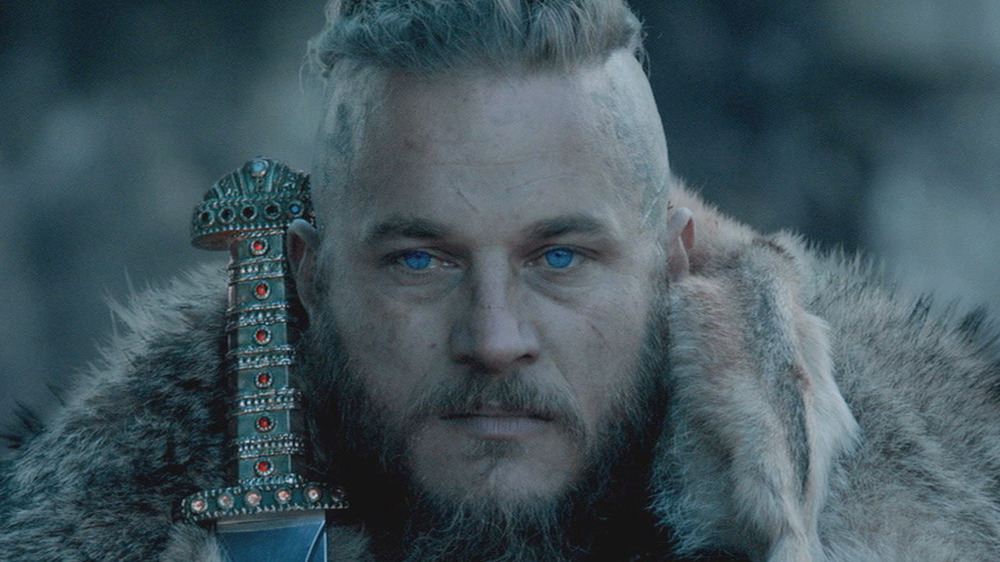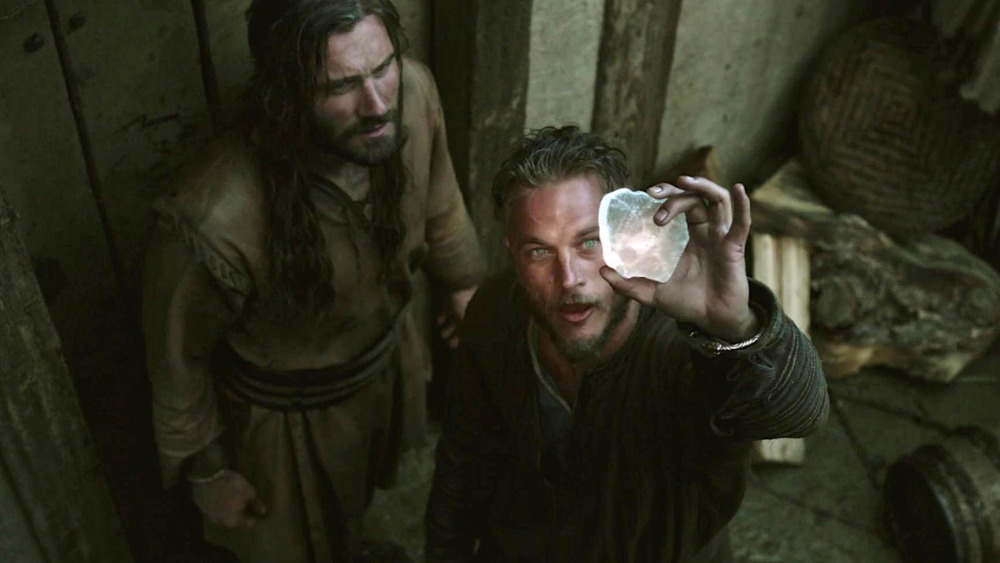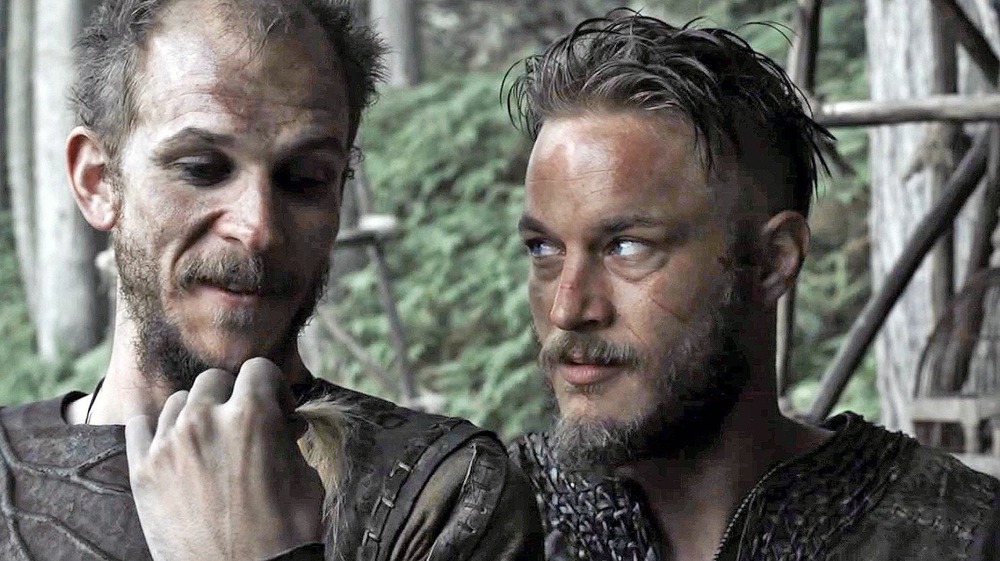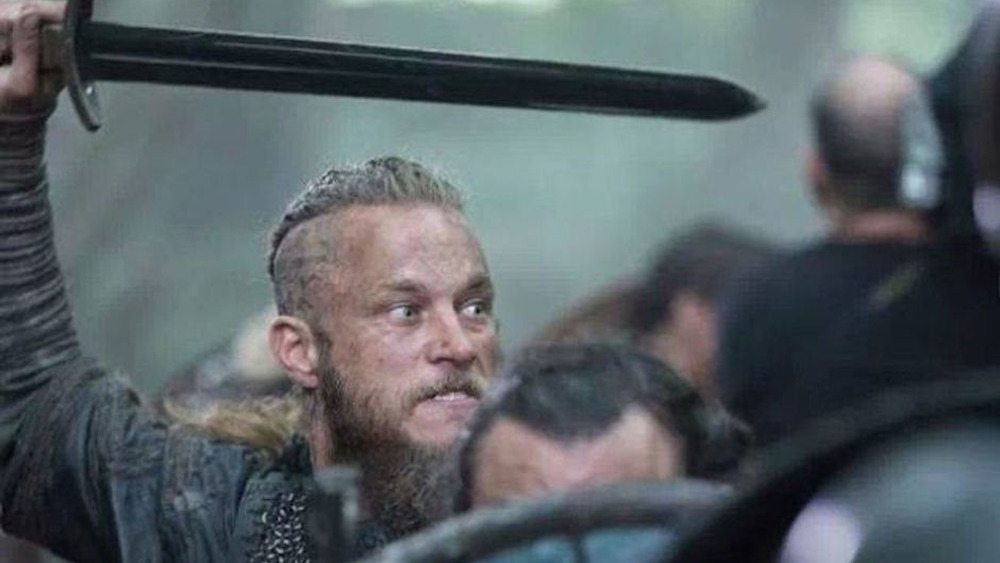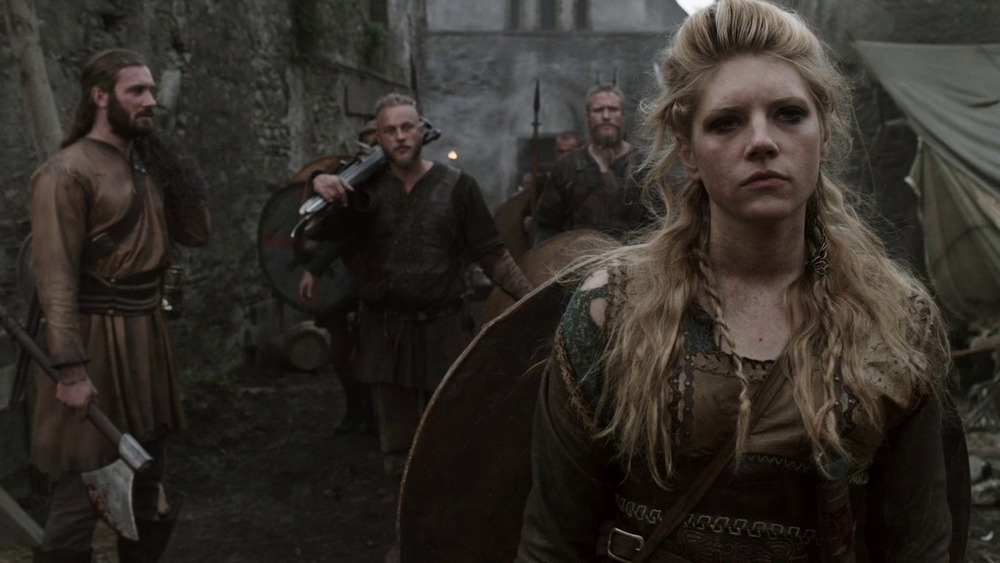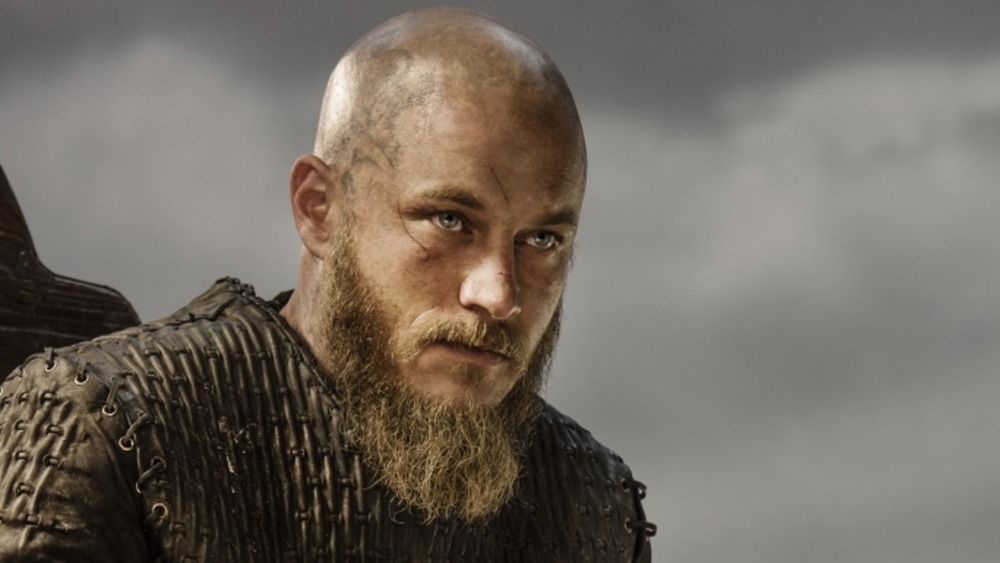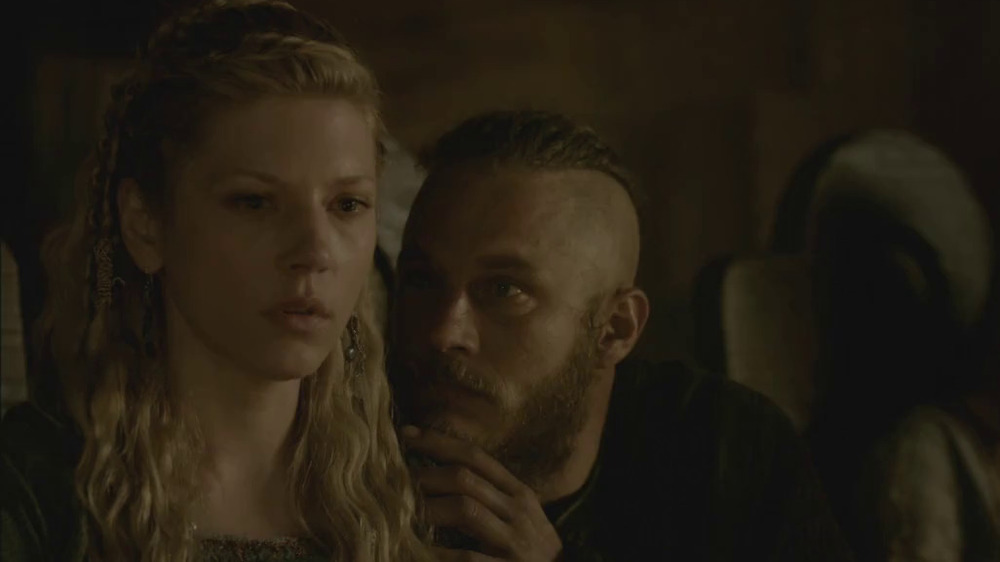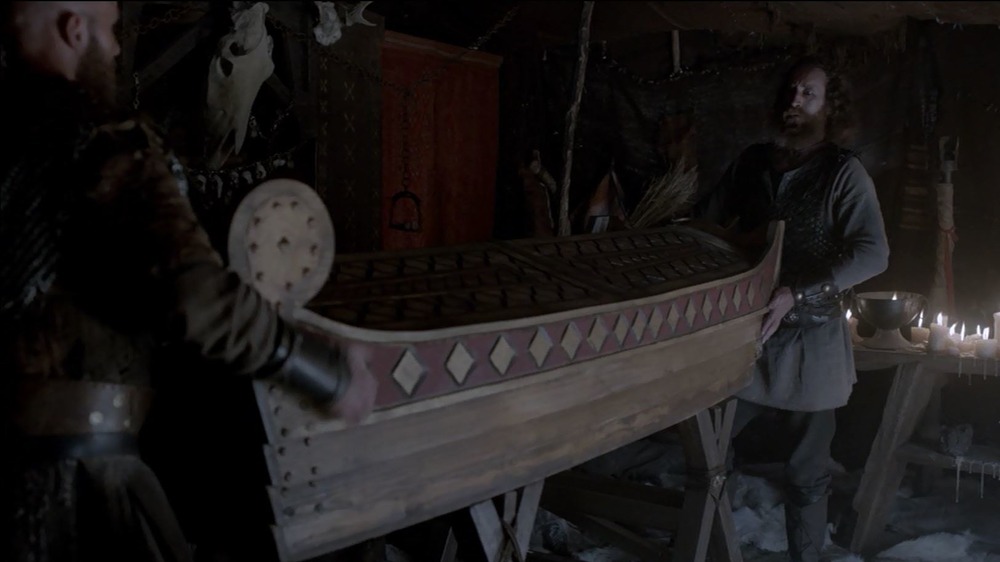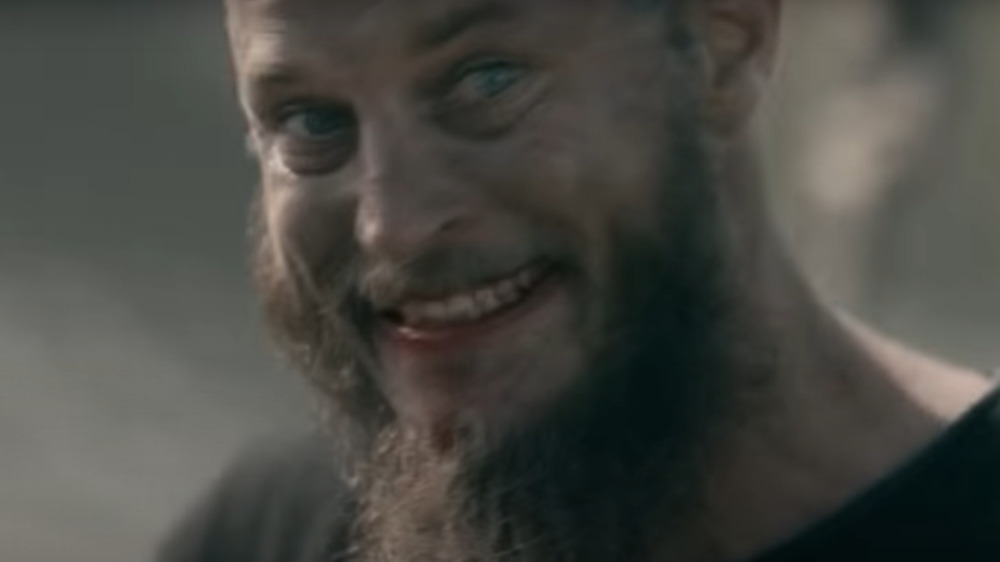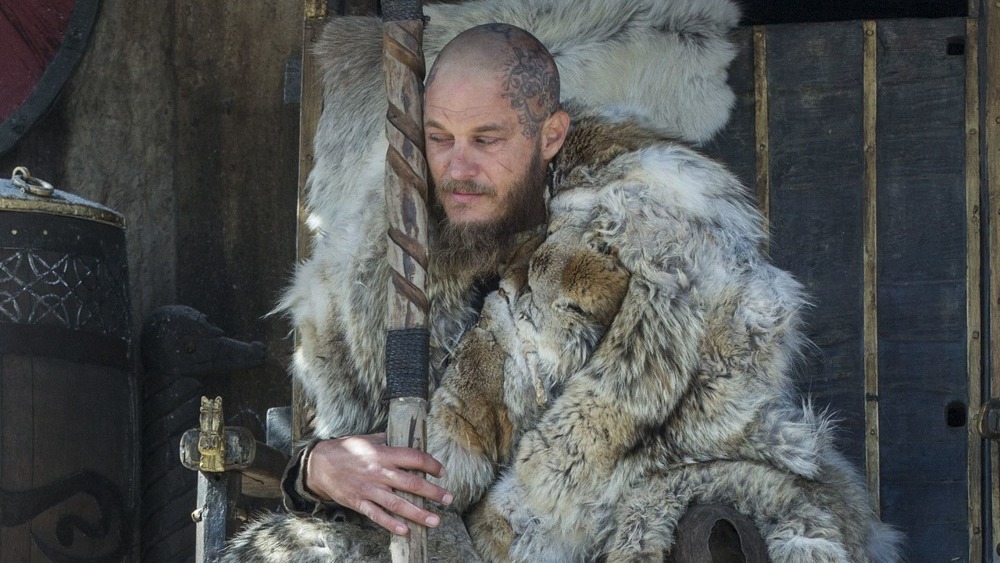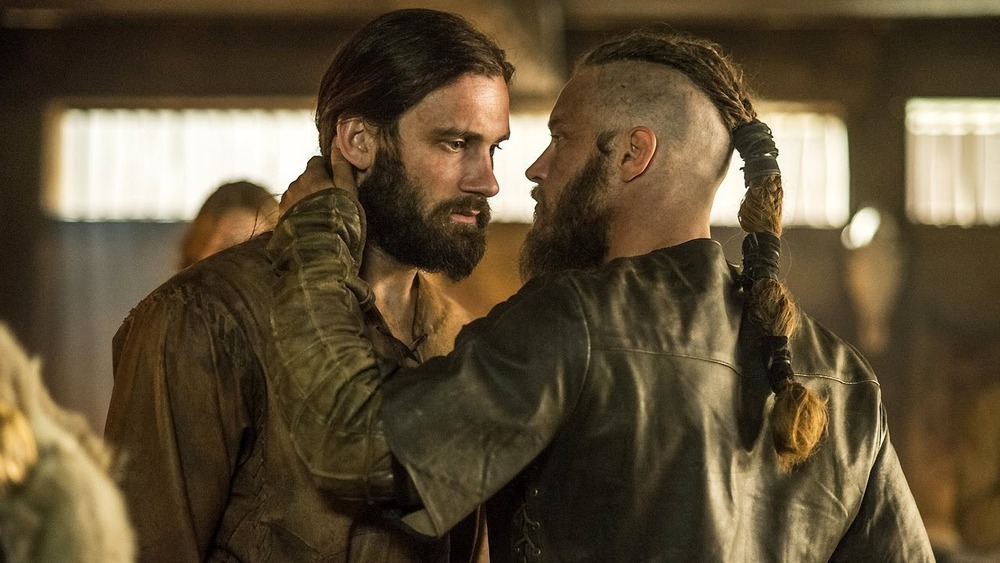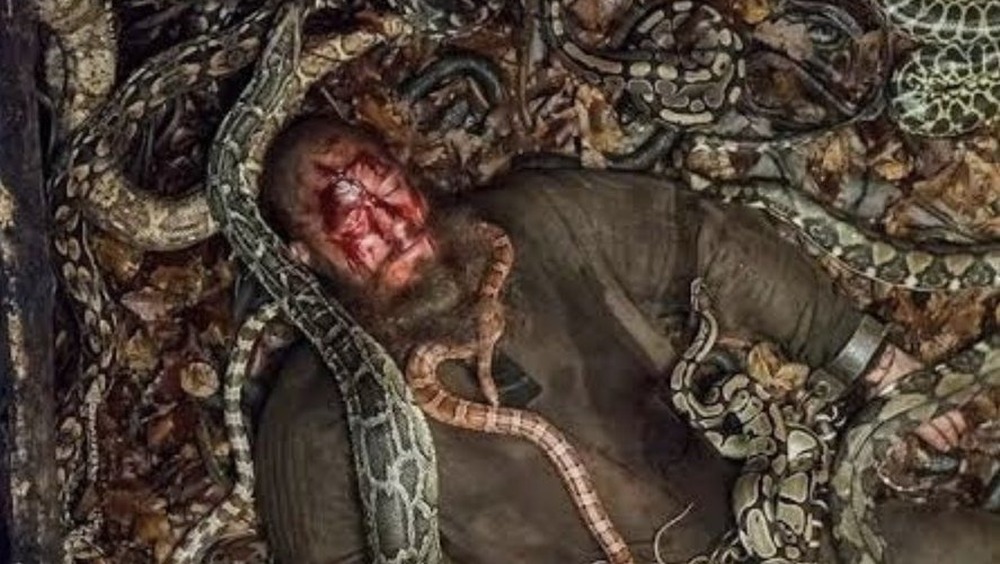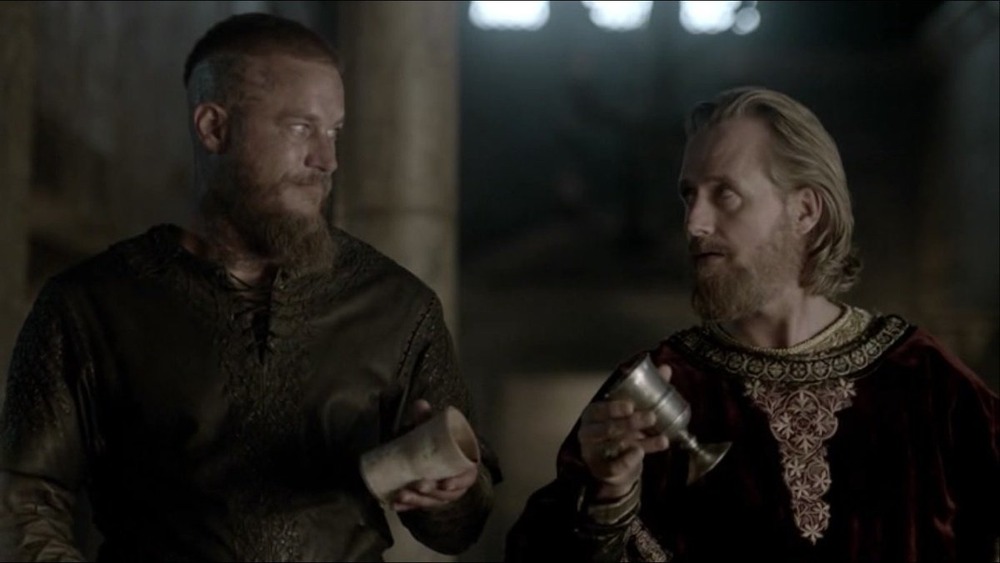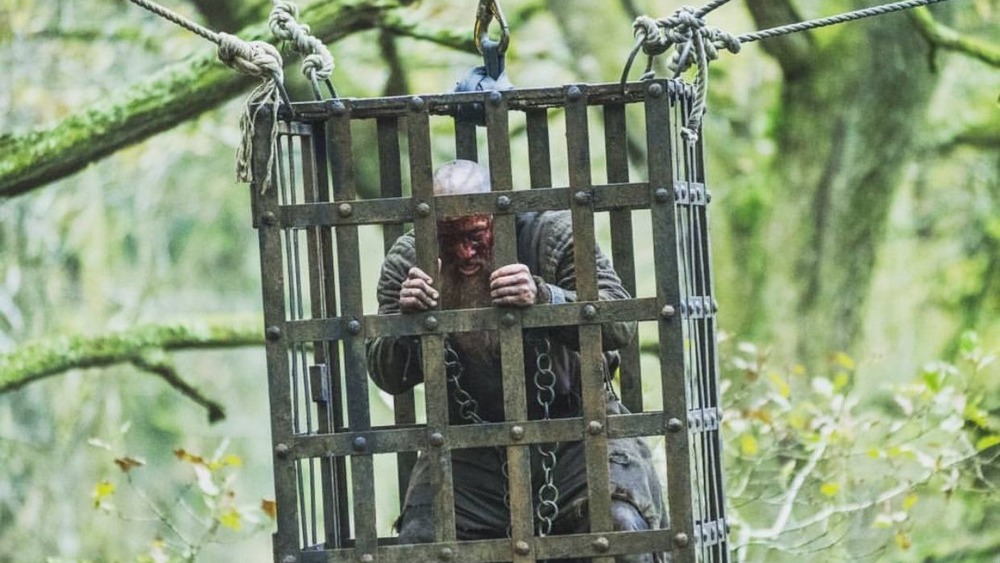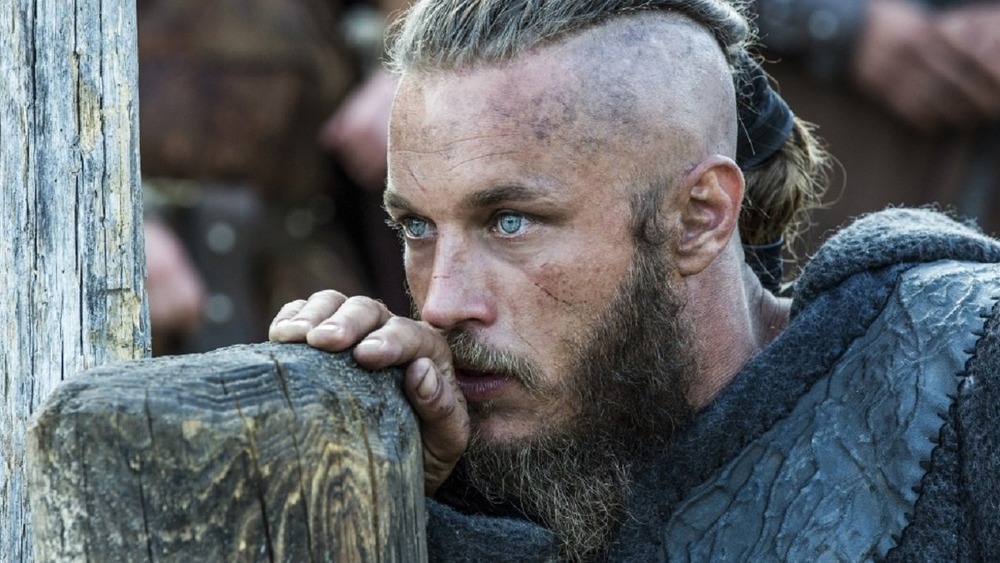Why Ragnar Is The Best Part Of Vikings
Ragnar Lothbrok is a savage, a genius, a fighter, and a lover. Above all, however, he is a leader who doesn't seek power, or need people to stroke his ego. Vikings follows many characters, but it is, first and foremost, the story of Ragnar — despite the fact that he dies about two-thirds of the way through the series. Ragnar's desire to explore the unknown lands to the west opens up the Viking age of exploration. Because of this, he's viewed as the father of all Vikings, a celebrity in an age when celebrity was reserved solely for a very vaunted few. He doesn't have to be around for the entire series, because his legacy carries as much weight as his actual presence.
But if he were just some conquering hero, he wouldn't be very interesting. In fact, he'd be just another plot set-up. What makes Ragnar interesting are all the conflicts in his personality, and the long and winding road his story takes. We're here to explore the details of what makes Ragnar the most interesting character among the many colorful men and women of Vikings.
Ragnar embraces technology
Today, technology considered cutting-edge involves advanced mathematics and rare metals. Then, a mere moment after it's been deemed cutting-edge, it's made obsolete. In Ragnar's time, however, a tool like the sunstone, which allows you to figure out what direction you're going based on the sun's shadow, is what's cutting-edge — and it remains cutting-edge for a long time. Many people, especially the Vikings, don't trust it, and even more don't understand what to use it for. Certainly Earl Haraldson feels this way. But Ragnar sees this tool as a way to push the edge of possibility and literally discover the rest of the world, especially since his people don't trust voyages into the open ocean.
In many ways, Ragnar is like the first astronauts who blasted into the void on untested technology and vessels we now consider primitive. Understanding how to use the sunboard and the sunstone shows Ragnar's technical intelligence. That he has ideas for how to apply this new technology to access new lands shows he is a true visionary.
Ragnar is friends with weirdos
By the end of Vikings, Floki is a respected elder. But at the beginning, he's an eccentric shipbuilder who can emote with trees. There's a reason he lives as something of a hermit, cut off from Kattegat proper: He's a weirdo. But, like all great people, Ragnar knows that weirdos can do amazing things.
We live in a world that is defined by weirdos, from Quentin Tarantino to Mark Zuckerberg. But in the first millennium, many weirdos were kept at arm's distance. Because Ragnar has long been friends with the strange man living in the woods, however, he's able to turn to Floki to build the vessel needed for a voyage across open sea. Not only does Floki make this boat secretly and against the will of Earl Haraldson, but from this trip, Ragnar receives his staunchest life-long supporter, rivaled only by Lagertha.
All great leaders need a weirdo in their corner. And the greatest leaders of all know that "weirdo" might just be another word for "genius."
Ragnar is a fierce and legendary warrior
All talk about intelligence and vision aside, Ragnar never would've risen to the top of the Viking hierarchy if he wasn't also one of the most fierce warriors of all time. In battle, he's never personally bested. When one considers his failed fight against his brother in Francia, one has to wonder if Ragnar might not have killed the great Rollo, had they not been pulled apart.
Now, Ragnar is magnetic from the first second you see him. Travis Fimmel is one heck of an actor. But it is only when he's fighting that Ragnar truly seems to come alive. In those moments, the viewer can see the fire in his eyes and feel the passion in his heart. Like any truly great warrior, Ragnar can best any other soldier, whether using sword, axe, spear, or even his bare hands. In the opening scene, we see him kill a man by turning the man's own sword on him, since Ragnar has lost the head of his own axe. He doesn't hesitate, prevaricate, or flinch. For Ragnar, there is only one way to go in battle: Onward to victory.
Ragnar lies to protect his wife after she kills Haraldson's spy
Upon Ragnar's return to England, Earl Haraldson sends a spy, Olafur, as a representative. Lagertha finds Olafur raping a woman and stops him. When he turns on her, she kills the man herself. Obviously, this is a huge deal, given the fact that the Earl didn't approve of the first raid, has warranted reasons to distrust Ragnar, and is looking for an excuse to kill him. Lagertha leaves England filled with rage and fear about what may happen due to this killing.
Upon their return to Kattegat, Earl Haraldson asks about Olafur, who had also been his cousin. Ragnar steps forward and claims he killed the spy. This gives Haraldson exactly what he wants: A justifiable reason for execution. Even after Lagertha steps forward to try and clarify what actually happened, the damage has been done.
Ragnar may have many shortcomings as a husband and father. But when push comes to shove, he will always protect those he loves with everything he has.
Ragnar is a trendsetter
Ragnar's haircut looks crazy, defies all conventions of what makes a "good-looking" haircut, and is absolute fire. Throughout Vikings, you notice more and more warriors, male and female, adopting the shaved sides and long top young Ragnar sports. You can also see this look all over the streets of the world's hippest cities — it's become quite popular over the last few years. Somehow, the floppy top over bald sides seems to actually look pretty good on a whole lot of people. Ragnar, it turns out, is a style visionary.
Later on, when Ragnar changes it up with a long beard and shorn head, he once again anticipates a real-world trend. Seemingly every balding millennial, and even some who aren't bald, is going for the completely shaved head, paired with an endlessly growing beard. It's a trend you can see everywhere, from city streets to mountain towns. Are we saying Ragnar started these trends? Not exactly. But he sure does have his finger on the pulse.
Ragnar loves strong women
We see Ragnar marry two women in Vikings, both of them formidable. Lagertha is a warrior as legendary as her one-time husband. Considering the fact that she's never really bested in battle, and is one of Vikings' longest lasting characters, she and Ragnar make a true power couple. In many ways, really, she's actually stronger and more stoic than Ragnar, who falls victim to his emotions quite often, and disappears after his great defeat in Francia.
Then there's Aslaug. At times, she appears to be little more than an unhappy kept wife. She also occasionally gives voice to her insecurities, especially in regards to how she compares to awe-inspiring shield maiden Lagertha. But it should be noted that Aslaug is a political powerhouse. She is a strong leader descended from a legendary warrior, who deftly navigates many slings and arrows sent her way when she usurps Lagertha's place as queen. She's originally surrounded by fierce maiden warriors of her own, and when she sees Ragnar, the man she wants, she gets him. Aslaug may not be the strongest woman of this warrior era, but today, she'd probably be a power exec running a Fortune 500 company.
Ragnar: The first cunning Viking?
As their battles against the English ramp up, the Vikings soon learn that their straightforward way of battling and raiding will not always be victorious. But Ragnar, ever the innovator, adapts: Recall the time he outfoxes Jarl Borg by burning his supply of food. His vision isn't always respected, however. Ragnar, smelling a trap, warns King Horik on their voyage to England to battle King Ecbert. Horik orders them to march straight into it, leading to a devastating loss. Later, Ragnar thwarts Horik's plan to kill him, thanks to Floki.
But perhaps Ragnar's best bit of trickery leads to their greatest victory, in Paris. Ragnar fakes his death, hiding this fact from all except Bjorn. Ragnar had asked for a Christian funeral, and so the Franks allow his coffin to be brought in. Once inside, a very much alive Ragnar jumps up, kills the Bishop, and takes the Emperor and Princess Gisla hostage, before running down to open the bridge gate and allow his Vikings to storm the city. This happens after several attempts to storm the city using conventional Viking battle tactics fail miserably. Only Ragnar's flexible thinking allows them to accomplish their goal.
Ragnar loves getting weird with it
There's something to be said for a leader holding to conventional virtues of temperance and sobriety. But there's also something to be said for a leader who's open to experimentation and exploration. Ragnar obviously knows his way around an ox horn full of mead, and we see him happily intoxicated throughout Vikings. But he's continually inquisitive about what else is out there, which is what makes him a great explorer and innovator.
This open attitude extends to all areas of his life. Consider Ragnar's interest in Yidu, and his further interest in her culture. Once he has her in his man-cave, he starts experimenting with her Chinese beliefs — and drugs, which doesn't end up going so well. Still, Ragnar's openness is admirable, and generally leads to positive experiences. He has no problem embracing "strange" customs, and even accepts Queen Kwenthrith peeing on him to cure his wound with comparative calmness. If he'd traveled further, or lived in a different time, one wonders what type of beatnik road trips Ragnar would've had, and what strange substances and customs he'd have experienced. Viking hashish, anybody?
King Ragnar hates the pomp of leading
Ragnar doesn't want to be a king: He just wants to be free to do what he wants to do, and he can't do that unless he's the boss. All other rulers of Kattegat seem to love big ceremonies and revel in sitting on the throne — and, crucially, they constantly need people reassuring them that they're in charge. As king, Ragnar is happier hiding backstage, looking out at everybody from the shadows. In fact, Ragnar says several times that he wishes he'd stayed a farmer, though he obviously doesn't regret becoming an explorer. But kingship comes with the responsibilities of ruling, and he's not crazy about those.
Ragnar doesn't need people kissing up to him to feel like he's in charge. He's also not blind to his own failings: When he returns to Kattegat after his long disappearance, he calls out how horrible of a king he's been, and asks for someone to take the crown from him. Ragnar also eschews grand decorations and clothes for a more humble look, though perhaps with some fine leather on his armor.
Ragnar hasn't sought out power as part of some ego trip — he just wants to show his people how much more there is in the world. Well, and maybe get some backrooms made especially for skulking.
Ragnar is trusting and forgiving of his loved ones
Ragnar is betrayed by his brother at least twice. He's betrayed by Floki. He's betrayed by Aslaug. And yet he forgives all of these people.
Arguably, his mercy is a problem. When Rollo first aligns with Jarl Borg against him, Ragnar really should execute his brother — but he forgives him. Later, Rollo betrays him by repulsing his return to Paris. Aslaug's attention to Harbard leads to the death of two people named Siggy closely connected to Ragnar's family, one being his granddaughter.
Still, Ragnar's mercy and compassion to those he loves remains a virtue. By letting Floki off the hook, Ragnar allows him to go on a life-changing adventure to the Mediterranean, which is also facilitated by Rollo as penance for his betrayal. Floki goes on to discover Iceland. As for Aslaug, while Ragnar is cold to her after her betrayal, he doesn't remove her as he could have. She, in turn, oversees the growth of Kattegat and the raising of his sons, who carry on and grow Ragnar's legacy.
Though on second thought, maybe he should have killed Rollo.
Even in death, Ragnar's presence is still felt
The last two seasons are mostly focused on Ragnar's sons, with some Lagertha moments mixed in, because she's amazing. But the fact that people show up to pay homage to Ragnar's progeny after Ragnar's fall and eventual death, to the point of mounting a revenge mission to England on his behalf, speaks to the power Ragnar has from beyond the grave. After Ragnar dies, his desire and ambition spread to all who know him and even those who only know of him.
When the English farmland Ragnar had always dreamed of is finally, legally gained by Ubbe, there's a moment of reflection on how Ragnar's wishes have finally come true. When Bjorn becomes king, he talks to his father. And all throughout the world, all people, Viking and otherwise, go on to know the story of Ragnar and the people he loved. He may be dead, but his echoes reverberate to this day.
Ragnar is open-minded
Ragnar is seen by the English and Franks as a "savage." They never make an attempt to understand his beliefs, except for Athelstan, who does briefly embrace the Norse gods, and Ecbert, to a small extent. Meanwhile, Ragnar learns about the Christian God from Athelstan and about strategy from his English enemies. Ragnar even embraces Christianity, if only slightly. This sends shockwaves down the line, to the point that two of Ragnar's sons convert to Christianity, as does King Olaf, and eventually, nearly all Viking descendants.
After Ragnar's flirtation with Christianity, he embraces Eastern philosophy during his time with Yidu — both while sober, and while tripping. Ragnar is willing to listen to people's beliefs, needs, and desires from all sides, and to try and understand the differences between them. There's no better example of this than his final encounter with Ecbert, during which Ragnar and one of his greatest enemies share drinks and deep conversation about the silliness of their beliefs. In the end, they find more common ground than differences. Hopefully, we all have a little Ragnar in us — we just need to learn how to bring it out.
Ragnar orchestrates his own final reckoning
Ragnar is at the end of his rope when he reemerges in Kattegat after abandoning his responsibilities. He's hated by everybody for having hidden the destruction of the first Wessex farm, and he hates himself for the failure in Paris, as well as his subsequent shirking of leadership. It's a vicious circle of self-hatred: He wants to die, but bears the weight of too much responsibility to just kill himself.
So, Ragnar launches one last voyage to England. No doubt this is in part to go on an adventure, but he goes knowing that he will finally receive the death he has long wanted in the process. In return, he will inspire his people to kill his two original rivals. This is why he finally brings Ivar, even though Ivar will be a hindrance. Ragnar knows he will be allowed to leave and return home with the news.
Ragnar's fate has long been tied to England, and he wants a final reckoning with the land and its kings. Ragnar also knows he will receive a punishment, which he feels he deserves. But so too does Ragnar know that his people will finally and authoritatively best the English kings with whom he has fought for most of his grown life. Checkmate — from the grave.
Ragnar is, simply, the man
Ragnar is an interesting and dynamic Viking leader. But let's just be honest : Ragnar is also simply the man. His desire to explore and his endless struggle for freedom is the whole reason for the series, for one thing. If there was no Ragnar, there would be no reason to follow the power struggles of Kattegat in Vikings, or, arguably, even much reason to fight over Kattegat at all. And if there was no historical (possibly mythical) Ragnar, there would be no Viking lineage to eventually conquer and unite England. Iceland and Greenland wouldn't have been colonized until centuries later. The Vikings pioneered oversea travel for Europeans, leading to trading, exploration, and connectivity that has continued to this day.
Ragnar inspires not only his kingdom, but all of Scandinavia. He encourages everybody to think bigger, especially his children and friends. He single-handedly pushes his people, and eventually the world, forward. Ragnar is the central dynamo to everything that happens in Vikings. So, of course, he's the best part of it.
